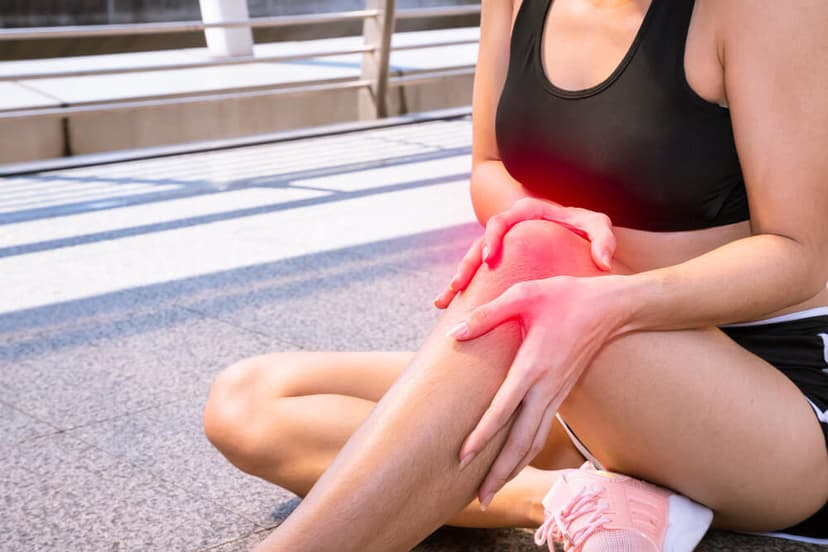Knee pain is a common complaint that can occur due to various reasons, including injury, overuse, underlying medical conditions, or the natural aging process. The knee is a complex joint composed of bones, ligaments, tendons, muscles, and cartilage, and any disruption or damage to these structures can lead to knee pain.

Affordable Knee Pain Treatment in Las Vegas
Experience the freedom of movement once again with our affordable knee pain treatment in Las Vegas. Our team of pain experts is committed to addressing the root causes of your knee pain, tailoring a comprehensive treatment plan just for you. Don't let knee discomfort limit your activities – we're here to help you regain your mobility and enjoy life to the fullest. Say goodbye to the limitations of knee pain and take the first step towards a pain-free, active lifestyle with us in Las Vegas.
What is Knee Pain?
The Anatomy of the Knee?
The knee is a complex hinge joint that connects the thigh bone (femur) to the shin bone (tibia) and the smaller bone in the lower leg (fibula). Central to its structure is the patella, or kneecap, which articulates with the femur to facilitate smooth movement. Ligaments, such as the anterior cruciate ligament (ACL) and posterior cruciate ligament (PCL), provide stability, while the meniscus, two wedge-shaped pieces of cartilage, acts as a cushion between the femur and tibia, absorbing shock and aiding in load distribution. This intricate interplay of bones, ligaments, and cartilage enables the knee to function as a pivotal joint in supporting body weight and facilitating various movements.
What Causes Knee Pain?
The possible causes of knee pain include:
Injuries: Knee pain often results from injuries, such as sprains, strains, tears, or fractures. These injuries can occur due to sudden movements, overextension, or direct trauma to the knee. For example, tearing of the ACL or meniscus commonly leads to knee pain.
Overuse: Repeated stress on the knee joint, often caused by activities like running, jumping, or repetitive movements, can lead to overuse injuries. Conditions like patellofemoral pain syndrome or iliotibial band syndrome can develop, causing pain around the kneecap or the outer side of the knee, respectively.
Osteoarthritis: This is a degenerative joint disease that commonly affects the knee joint. Over time, the cartilage that cushions the bones in the knee can wear away, leading to bone-on-bone contact and resulting in pain, stiffness, and swelling.
Rheumatoid Arthritis: Rheumatoid arthritis is an autoimmune condition that can cause inflammation and damage to the knee joint, leading to pain, stiffness, and swelling.
Tendonitis: Inflammation of the tendons around the knee, such as patellar tendonitis (also known as jumper's knee) or quadriceps tendonitis, can cause knee pain.
What are the Symptoms of Knee Damage?
Pain: Knee pain can range from a dull ache to sharp, stabbing pain. The intensity and location of the pain may vary depending on the specific condition or injury. Swelling: Inflammation of the knee joint can lead to visible swelling, often accompanied by warmth and tenderness around the joint.
Stiffness: Knee pain may cause stiffness and reduced range of motion, making it difficult to fully bend or straighten the knee.
Weakness or instability: Some individuals with knee pain may experience weakness or a feeling of instability in the knee, making it challenging to bear weight or perform certain activities.
Clicking or popping: In some cases, knee pain may be accompanied by clicking, popping, or grinding sounds during movement. These sounds can indicate the presence of a meniscal tear or other structural issues within the knee joint.
How is Knee Pain Treated?
Physical Therapy: Engaging in a tailored physical therapy program can be instrumental in alleviating knee pain. Therapists employ targeted exercises to strengthen surrounding muscles, improve flexibility, and correct biomechanical issues, fostering long-term relief and enhanced joint function.
Nonsteroidal Anti-Inflammatory Drugs (NSAIDs): Over-the-counter NSAIDs, such as ibuprofen, can effectively manage knee pain by reducing inflammation and mitigating discomfort. These medications offer a readily accessible and often rapid solution for individuals seeking temporary relief from mild to moderate knee pain.
Intra-Articular Injections: Injectable treatments, like corticosteroids or hyaluronic acid, may be recommended to directly target knee joint inflammation. Administered by healthcare professionals, these injections can provide substantial relief for those experiencing persistent pain, aiding in the restoration of joint mobility and function.
Weight Management: Maintaining a healthy weight is a proactive approach to manage knee pain, particularly for individuals with osteoarthritis. Shedding excess pounds can alleviate stress on the knee joints, diminishing pain and enhancing overall joint health over time.
Orthopedic Braces and Supports: Utilizing orthopedic braces or supports can provide additional stability to the knee joint, reducing strain and promoting proper alignment. These supportive devices are valuable for both injury prevention and as part of a comprehensive treatment plan for managing various knee conditions.
Frequently Asked Questions About Knee Pain
Can weather changes affect knee pain?
Some individuals with knee issues report increased pain during changes in weather, particularly in cold and damp conditions. The exact reasons are not well understood, but it may be related to changes in joint pressure or fluid levels.
Is there a relationship between knee pain and mental health issues?
Yes, chronic knee pain can have a significant impact on mental health, leading to conditions like depression and anxiety. Managing both physical and emotional aspects of knee pain is crucial for overall well-being.
Can certain types of exercise or sports increase the risk of knee pain?
Yes, high-impact sports or activities that involve repetitive knee movements, like running or basketball, can increase the risk of knee injuries and pain. Proper training techniques, conditioning, and protective gear are essential to reduce this risk.
Can knee pain be triggered or worsened by food allergies or sensitivities?
For some individuals, food allergies or sensitivities may lead to inflammation, which can exacerbate knee pain, particularly in cases of underlying joint conditions. Identifying and eliminating trigger foods may help.
Can previous injuries or surgeries in other parts of the body contribute to knee pain?
Yes, injuries or surgeries in other areas of the body, like the hip or lower back, can alter gait and biomechanics, potentially leading to knee pain over time.
Knee Pain Treatment in Las Vegas
Don't let knee pain hold you back any longer. Take the first step towards a pain-free future by scheduling a consultation with our pain specialists in Las Vegas. Our compassionate team is ready to guide you on your journey to regaining your mobility and enjoying life to the fullest. Contact us today and discover the transformative power of shockwave therapy for knee pain.
